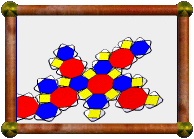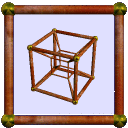 | Cube |
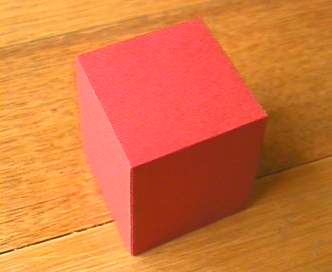
- Vertex description: 4.4.4
- Faces: 6
- Edges: 12
- Vertices: 8
- Dual: Octahedron
- Stellations:
- Fully supported: 1 (1 reflexible, 0 chiral)
- Miller's rules: 1 (1 reflexible, 0 chiral)
One of the five regular convex polyhedra known as the Platonic solids.
The one polyhedron everyone is familiar with! This model was made from a
single connected net, printed on one sheet of A4 paper. Nets can be generated
and printed at any size using any of
Small Stella,
Great Stella,
or
Stella4D,
even in the free demo versions.

|
Here's a cube in Stella, using a 3-view layout featuring the cube
itself, the unfolded net, and a partially folded net.
See more screenshots here.
|
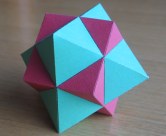
|
Here is a compound of the
cube with its dual.
Notice how the cube's vertices sit above the octahedron's faces, and
vice versa? Also the edges of the two polyhedra bisect each other at
right-angles.
|
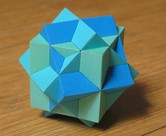
|
Multiple cubes can be arranged in an intersecting manner to form
various compounds. Here is one consisting of 3 intersecting cubes.
|
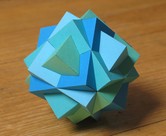
|
Here is another compound consisting of 4 intersecting cubes.
|
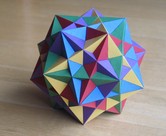
|
Here's the best-known cube compound, consisting of 5 intersecting cubes.
|
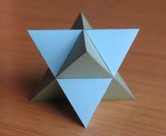
|
The cube has no stellations
but it does have one fully symmetric
faceting, the Stella
Octangula. You can see that it has the same vertices as a cube. This
faceting is also a compound of two
tetrahedra and a
stellation of the octahedron.
|
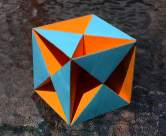
|
The cube also has subsymmetric
facetings, meaning they have
less symmetry than the cube itself. Here is an example.
Again, you can see that it has the same vertices as a cube. The yellow
faces are rectangles that cut through the centre of the model. The
blue faces are bow ties, that is, crossed quadrilaterals rather than
two separate triangles.
|
